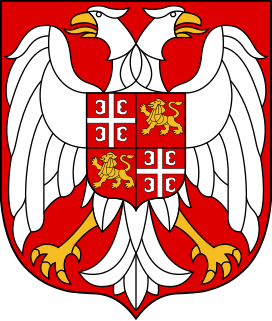 W
WParliamentary elections were held in Yugoslavia on 31 May 1992. The elections were boycotted by almost all opposition parties in protest at both how the electoral law had been passed, and the unequal access to finance and the media given to the governing and opposition parties. Independent Milan Panić became federal Prime Minister. Following mass protests, Panić and federal President Dobrica Ćosić agreed to hold new elections in December under a new electoral system.
 W
WA referendum on state symbols was held in the Republic of Serbia on 31 May 1992. The referendum decided the flag, the national anthem and the coat of arms. Although the referendum failed due to low turnout, the National Assembly recommended that the red star be removed from the Serbian flag on 21 June.
 W
WGeneral elections were held in the Republic of Serbia on 20 December 1992. The vote was held only two years after the previous election, and as a result of a referendum which approved holding early elections.
 W
WBetween 1992 and 1994, the Federal Republic of Yugoslavia (FRY) experienced the third-longest period of hyperinflation in world economic history. This period spanned 22 months, from March 1992 to January 1994. Inflation peaked at a monthly rate of 313 million percent in January 1994. Daily inflation was 62%, with an inflation rate of 2.03% in 1 hour being higher than the annual inflation rate of many developed countries. The inflation rate in January 1994, converted to annual levels, reached 116,545,906,563,330 percent (116.546 billion percent, or 1.16 × 1015 percent). During this period of hyperinflation in FR Yugoslavia, store prices were stated in conditional units – point, which was equal to the German mark. The conversion was made either in German marks or in dinars at the current "black market" exchange rate that often changed several times per day.
 W
WOperation Maritime Guard was a NATO blockade, in the international waters of the Adriatic Sea, of the former Yugoslavia.
 W
WUnited Nations Security Council resolution 727, adopted unanimously on 8 January 1992, after reaffirming resolutions 713 (1991), 721 (1991), 724 (1991) and considering a report by the Secretary-General Boutros Boutros-Ghali, the Council welcomed the recent signing of an agreement in Sarajevo regarding a ceasefire to the conflicts in the Socialist Federal Republic of Yugoslavia.
 W
WUnited Nations Security Council resolution 740, adopted unanimously on 7 February 1992, after reaffirming resolutions 713 (1991), 721 (1991), 724 (1991) and 727 (1992) and considering a report by the Secretary-General Boutros Boutros-Ghali, the Council approved plans for a peacekeeping mission in the Socialist Federal Republic of Yugoslavia.
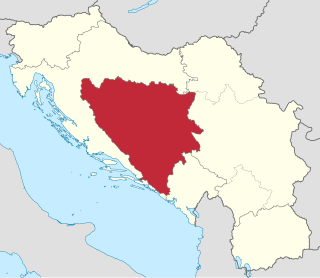 W
WUnited Nations Security Council resolution 752, adopted unanimously on 15 May 1992, after reaffirming resolutions 713 (1991), 721 (1991), 724 (1991), 727 (1992), 740 (1992) 743 (1992) and 749 (1992), the Council expressed concern at the situation in the Yugoslavia, in particular the fighting in Bosnia and Herzegovina, demanding that all parties end the fighting and respect the ceasefire signed on 12 April 1992.
 W
WUnited Nations Security Council resolution 757 was adopted on 30 May 1992. After reaffirming resolutions 713 (1991), 721 (1991), 724 (1991), 727 (1992), 740 (1992) 743 (1992), 749 (1992) and 752 (1992), the Council condemned the failure of the authorities in the Federal Republic of Yugoslavia to implement Resolution 752.
 W
WUnited Nations Security Council resolution 758, adopted unanimously on 8 June 1992, after reaffirming resolutions 713 (1991), 721 (1991), 724 (1991), 727 (1992), 740 (1992) 743 (1992), 749 (1992), 752 (1992) and 757 (1992), the Council, in accordance with a report by the Secretary-General Boutros Boutros-Ghali, decided to enlarge the mandate and strength of the United Nations Protection Force (UNPROFOR) in former Yugoslavia.
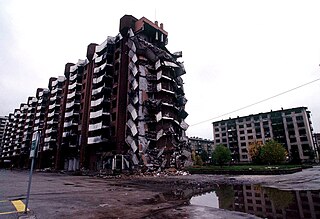 W
WUnited Nations Security Council resolution 760, adopted unanimously on 18 June 1992, after reaffirming resolutions 752 (1992), 757 (1992) and 758 (1992) which brought attention to the need for humanitarian aid in the former Yugoslavia, the Council, acting under Chapter VII of the United Nations Charter, exempted humanitarian goods such as food and medical aid from the prohibitions under Resolution 757.
 W
WUnited Nations Security Council resolution 761, adopted unanimously on 29 June 1992, after reaffirming resolutions 713 (1991), 721 (1991), 724 (1991), 727 (1992), 740 (1992) 743 (1992), 749 (1992), 752 (1992), 757 (1992), 758 (1992) and 760 (1992), the Council authorised the Secretary-General to immediately deploy additional elements of the United Nations Protection Force in Croatia and Bosnia and Herzegovina during the Yugoslav Wars.
 W
WUnited Nations Security Council resolution 762, adopted unanimously on 30 June 1992, after reaffirming resolutions 713 (1991), 721 (1991), 724 (1991), 727 (1992), 740 (1992) 743 (1992), 749 (1992), 752 (1992), 757 (1992), 758 (1992), 760 (1992) and 761 (1992), the Council urged all parties to honour their commitments to the United Nations plan in former Yugoslavia and complete a cessation of hostilities.
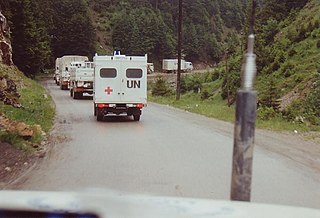 W
WUnited Nations Security Council resolution 764, adopted unanimously on 13 July 1992, after reaffirming previous resolutions on the topic, the Council noted the violations of the agreement concerning Sarajevo International Airport which established a security corridor and demanded withdrawal of anti-aircraft weapon systems, and decided to authorise an additional deployment of United Nations Protection Force personnel. It would increase the size of the Force to two infantry battalions.
 W
WUnited Nations Security Council resolution 769, adopted unanimously on 7 August 1992, after reaffirming Resolution 743 (1992) and all subsequent resolutions relating to the United Nations Protection Force (UNPROFOR), the Council authorised enlargements in the strength and mandate of UNPROFOR to "enable the Force to control the entry of civilians into the United Nations Protected Areas", in addition to performing immigration and customs functions.
 W
WUnited Nations Security Council resolution 770, adopted on 13 August 1992, after reaffirming previous resolutions on the topic, including Resolution 743 (1992), Resolution 749 (1992), Resolution 761 (1992) and Resolution 764 (1992), the Council recognised the humanitarian situation in Sarajevo and other areas in Bosnia and Herzegovina.
 W
WUnited Nations Security Council resolution 771, adopted unanimously on 13 August 1992, after reaffirming resolutions 713 (1991), 721 (1991), 724 (1991), 727 (1992), 740 (1992), 743 (1992), 749 (1992), 752 (1992), 757 (1992), 758 (1992), 760 (1992), 761 (1992), 762 (1992), 764 (1992), 769 (1992) and 770 (1992), the Council expressed concern at and condemned widespread violations of international humanitarian law in the territory of the former Yugoslavia and in particular, Bosnia and Herzegovina.
 W
WUnited Nations Security Council resolution 776, adopted on 14 September 1992, after reaffirming Resolution 743 (1992) and noting offers of assistance made by Member States since the adoption of Resolution 770 (1992), the Council authorised an increase in the size and strength of the United Nations Protection Force in Bosnia and Herzegovina and other areas of the former Yugoslavia.
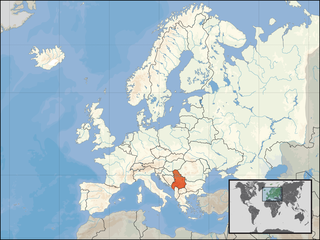 W
WUnited Nations Security Council resolution 777, adopted unanimously on 19 September 1992, after reaffirming Resolution 713 (1992) and all subsequent resolutions on the topic, the Council considered that, as the state known as the Socialist Federal Republic of Yugoslavia (SFRY) ceased to exist, it noted that under Resolution 757 (1992), the claim by the Federal Republic of Yugoslavia to continue automatic membership in the United Nations was not widely accepted and so determined that membership of the SFRY in the United Nations cannot continue. Therefore, the Council recommended to the General Assembly that the Federal Republic of Yugoslavia cease participation in the General Assembly and apply for membership in the United Nations.
 W
WUnited Nations Security Council resolution 779, adopted unanimously on 6 October 1992, after reaffirming Resolution 743 (1992) and subsequent resolutions and noting a report by the Secretary-General Boutros Boutros-Ghali submitted pursuant to resolutions 743 and 762 (1992), the Council authorised the United Nations Protection Force (UNPROFOR) to assume responsibility for monitoring the complete withdrawal of the Yugoslav People's Army from Croatia, demilitarization of the Prevlaka peninsula and the removal of heavy weapons from neighbouring areas of Croatia and Montenegro in co-operation with the European Community Monitoring Mission.
 W
WUnited Nations Security Council resolution 786, adopted unanimously on 10 November 1992, after reaffirming Resolution 781 (1992), the Council approved a recommendation by the Secretary-General Boutros Boutros-Ghali to increase the strength of the United Nations Protection Force (UNPROFOR) in Bosnia and Herzegovina by 75 observers to monitor the ban on military flights over the country.
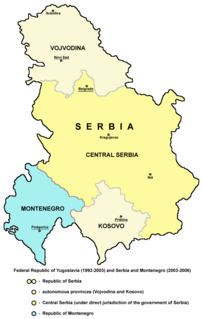 W
WUnited Nations Security Council resolution 787, adopted on 16 November 1992, after reaffirming Resolution 713 (1991) and all subsequent resolutions on the topic, the Council called upon the parties in Bosnia and Herzegovina to consider the draft outline constitution as a basis for negotiating a political settlement of the conflict in the country, and went on to impose further international sanctions on the Federal Republic of Yugoslavia.
 W
WUnited Nations Security Council resolution 795, adopted on 11 December 1992, after expressing concern about possible developments which could undermine confidence and stability in the former Yugoslav Republic of Macedonia and welcoming the Organization for Security and Co-operation in Europe (OSCE) mission in Macedonia, the Council recalled Chapter VIII of the United Nations Charter and authorised the Secretary-General Boutros Boutros-Ghali to deploy a presence of the United Nations Protection Force (UNPROFOR) in the border areas of Macedonia.
 W
WUnited Nations Security Council resolution 798, adopted unanimously on 18 December 1992, after reaffirming 770 (1992) and 771 (1992) and supporting an initiative by the European Council.The Council condemned reports of the massive, organized and systematic detention and rape of women, in particular Muslim women, in Bosnia and Herzegovina during the Bosnian War.
 W
WEarly parliamentary elections were held in the Federal Republic of Yugoslavia between 20 December 1992 and 3 January 1993, following changes to the constitution in September 1992. The Socialist Party of Serbia emerged as the largest party in Parliament, winning 47 of the 138 seats.